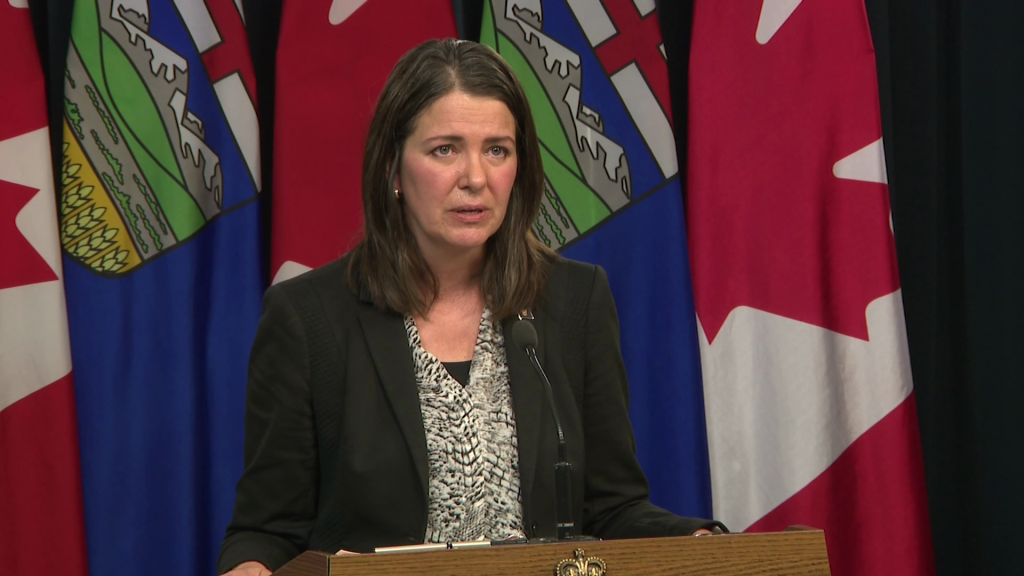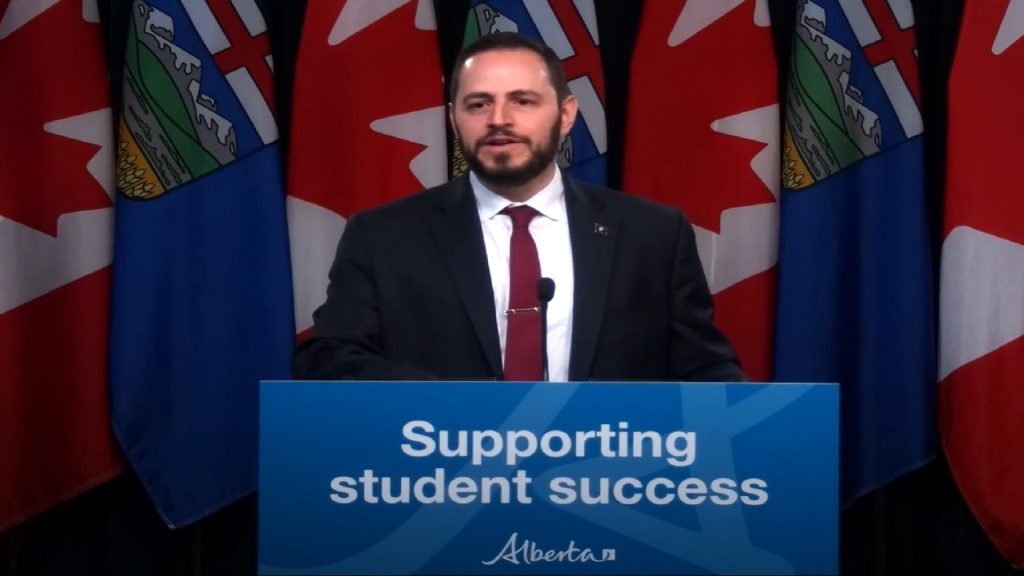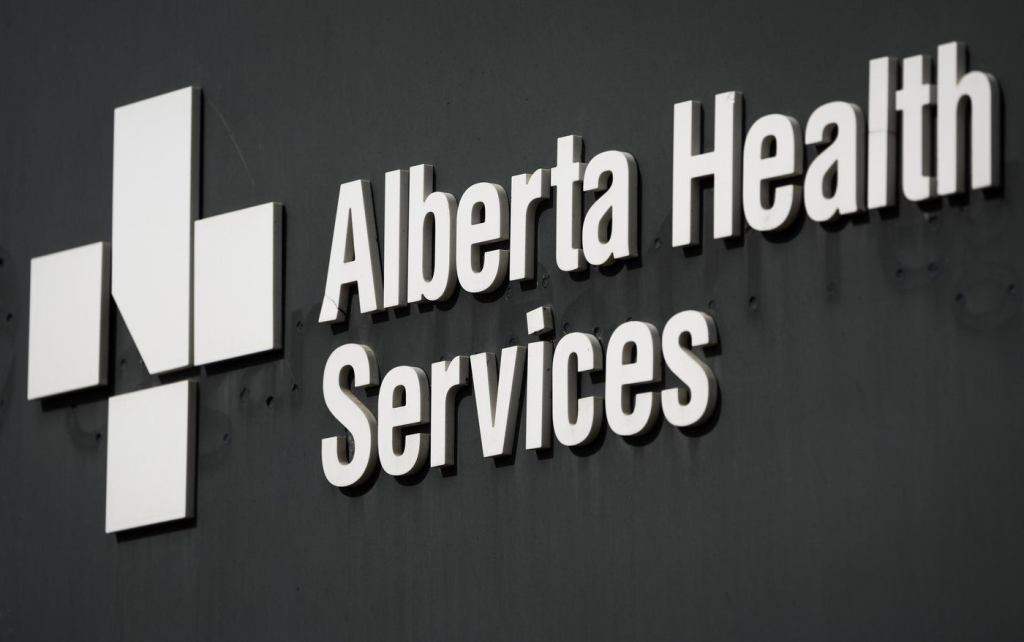Alberta government to provide emergency funds for evacuees of wildfires

Posted May 8, 2023 9:39 am.
Last Updated May 9, 2023 12:21 pm.
The Alberta government is providing emergency financial assistance for those affected by the wildfires across the province.
As of writing, 98 active fires are burning in various parts of Alberta, with 27 “out of control,” and nearly 30,000 people have been forced from their homes.
Alberta Premier Danielle Smith and Public Safety Minister Mike Ellis made the announcement on funds in a wildfire update Monday.
Starting on May 9, any Albertan that has been forced to evacuate their homes due to the wildfires will be eligible for one-time emergency financial assistance.
Those eligible will receive $1,250 per adult and an additional $500 per dependent child under 18 years. For example, a family of four will receive $3,500.
“These payments will help evacuees pay for accommodations, food, and other basic necessities,” Smith told reporters.
“The payments will make these expenses one less thing for people to worry about, that they can concentrate on their families and their own wellbeing.”
The province says evacuees can apply for the payment online using an Alberta.ca account. Funds can take up to 24 hours to appear in accounts and will be disbursed via e-transfer.
Those unable to receive an e-transfer or who cannot apply online are asked to call 310-4455 for assistance and to make alternate payment arrangements.
Smith initially said evacuees were eligible if they had been out of their homes for seven consecutive days. The province clarified that statement Tuesday, saying evacuees have to be out for seven days total to be eligible.
“If residents were evacuated, returned to their homes, and then were re-evacuated, they are eligible if it’s a cumulative total of seven days,” the province told CityNews in a statement. “We are currently updating online content to reflect that, and officials will reiterate that at today’s media availability.”
This comes after Smith spoke with Prime Minister Justin Trudeau by phone. He says the federal government will provide aid that includes a matching fund with the Red Cross to help those affected.
BREAKING:
Alberta has formally requested federal assistance to deal with the ongoing wildfire crisis. #yeg #yyc #ableg #abwildfire pic.twitter.com/6S7KMjRCbn
— Courtney Theriault (@cspotweet) May 8, 2023
In addition, Smith says that anyone that makes a cash donation through the Red Cross or other charities can receive a non-refundable tax credit on the first $200 due to a 60 per cent charitable tax credit and 15 per cent from the federal government.
TELUS made a $5 million contribution, and the Edmonton Oilers Community Foundation will dedicate its proceeds from the 50/50 draw from the playoffs to charities starting Tuesday.
Call for more firefighters
Christie Tucker, a spokesperson for Alberta Wildfire, says Alberta currently has over 700 wildland firefighters and “heavy equipment and air tankers” to respond to wildfires in the province.
In addition, she says 20 firefighters arrived from British Columbia on Sunday, and close to 80 wildland firefighters from Ontario and Quebec.
“We’ve also requested additional firefighting resources through the Canadian Interagency Forest Fire Centre in Winnipeg,” Tucker said.
“We’ve asked for up to 1,000 firefighters from the Yukon, Ontario, Nova Scotia, New Brunswick, and we’re expecting them to arrive in the next week.”
Smith also made a callout for help with the wildfires to anyone with “a private sector company, if you are fire fighting qualified, and you are willing to lend a helping hand.”
She asks those willing and able to send an email to emergencysupportoffers@gov.ab.ca.
“Government officials will assess your qualifications and will let you know how you can help play a role in responding to this unprecedented fire season.”
She says the government wanted to incorporate other indigenous communities with notable firefighting experience.
“We … wanted to find a pathway so that people can be brought on board safely,” she said.
“We want to ensure that individuals who are lending a hand are going to have the sufficient training so that they can work with the teams. And so we are giving it a try.”
Ellis requested numerous resources for the wildfires, including firefighting resources, engineering supports, water purification resources, and the assistance of the RCMP to support “security and evacuation as required.”
He also requested Canadian military personnel to “provide a measure of security for evacuated communities to guard against looting and disorder.”
“I’ve … recently spoken to Minister Blair, and he is beginning to start to action the items on the list that we have provided them,” Ellis said.
“We have full faith and competence in our firefighters and with wildlife. We certainly have full confidence in the Alberta Emergency Management Association, and it is absolutely a coordinated effort not just across the province but a coordinated effort throughout the country to ensure that we address not just the fires that are going on in Alberta but, of course as well as British Columbia and Saskatchewan who also have fires that are currently ongoing.”
Cooler temperatures a boon, may warm by weekend
Tucker adds around 390,000 hectares have burned thus far, but says firefighters have felt a slight reprieve from the weather.
“This is giving firefighters a helping hand, causing less active wildfires, allowing them to work on parts of fires they hadn’t been able to access before,” she said.
“It’s a much-needed chance to make progress on some of these powerful, challenging wildfires, but we’re not out of the woods yet.”
She says temperatures are expected to warm up by the weekend.
“Which could raise fire danger levels again, and we anticipate wind direction could shift, which will change how we tackle these fires,” Tucker said.
RELATED:
- Alberta wildfires: officials hoping rain, cooler weather slows blazes
- Alberta declares state of emergency due to wildfires
- Danielle Smith, Rachel Notley meet to discuss wildfire situation
Smith says evacuations at numerous locations affected have been going well.
“Healthcare workers across the province are working around the clock to ensure patients and residents are safe and cared for in temporary locations, and AHS is contacting the families of loved ones to share the patient and resident location information,” Smith said.
“I want to be clear despite these evacuations, our healthcare system is still well equipped and will continue to meet the needs of Albertans from all corners of the province.”
Smith activated the cabinet’s emergency management committee Friday and said daily media briefings would be on the wildfire situation.
Saturday, a provincial state of emergency was declared.
Close to 100 fires remained active Monday during an unusually early and intense fire season.
So far this year, 405 wildfires have burned nearly 400,000 hectares, according to the latest data available on the Alberta government’s website. Last year at this time, 180 fires had burned 417 hectares.
In Fox Lake, about 550 kilometres north of Edmonton, the province said a 4,400-hectare wildfire destroyed 20 homes, an RCMP detachment, a store and the community’s water treatment plant.
More than 40 structures, mostly homes, have been lost on the Little Red River Cree Nation, which includes three communities in northern Alberta.
Darryel Sowan, the emergency management communications co-ordinator, says some 3,700 people left the area quickly after the evacuation order was put in place.
There is no road into the community, so people had to use boats, while higher-risk people were flown out.
“Because it’s isolated, a lot of those people have never even been away from the reserve,” Sowan said Monday.
“We want to get them back there and they want to go home. We are trying our best.”
Chief Conroy Sewepagaham posted on social media Monday that officials are planning to do a full assessment of the community.
They will use aerial images to try to see which homes have been damaged or destroyed, he said.
An evacuation order was lifted late Sunday for Edson, a town of about 8,400 people west of Edmonton.
-With files from Tiffany Goodwein








